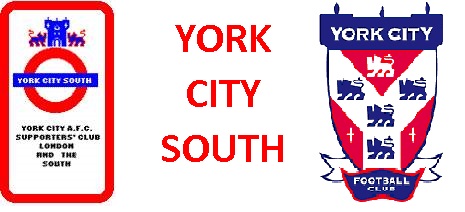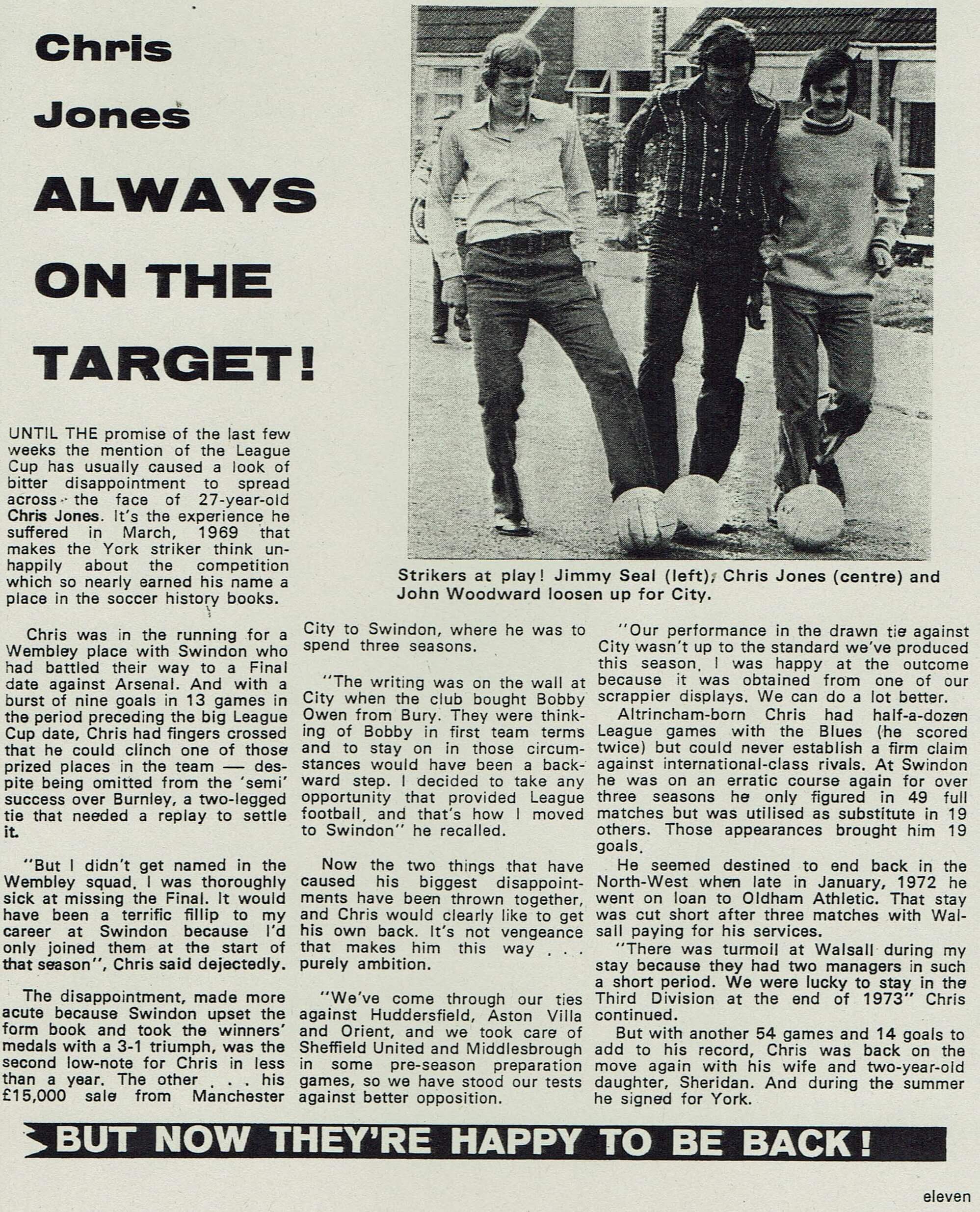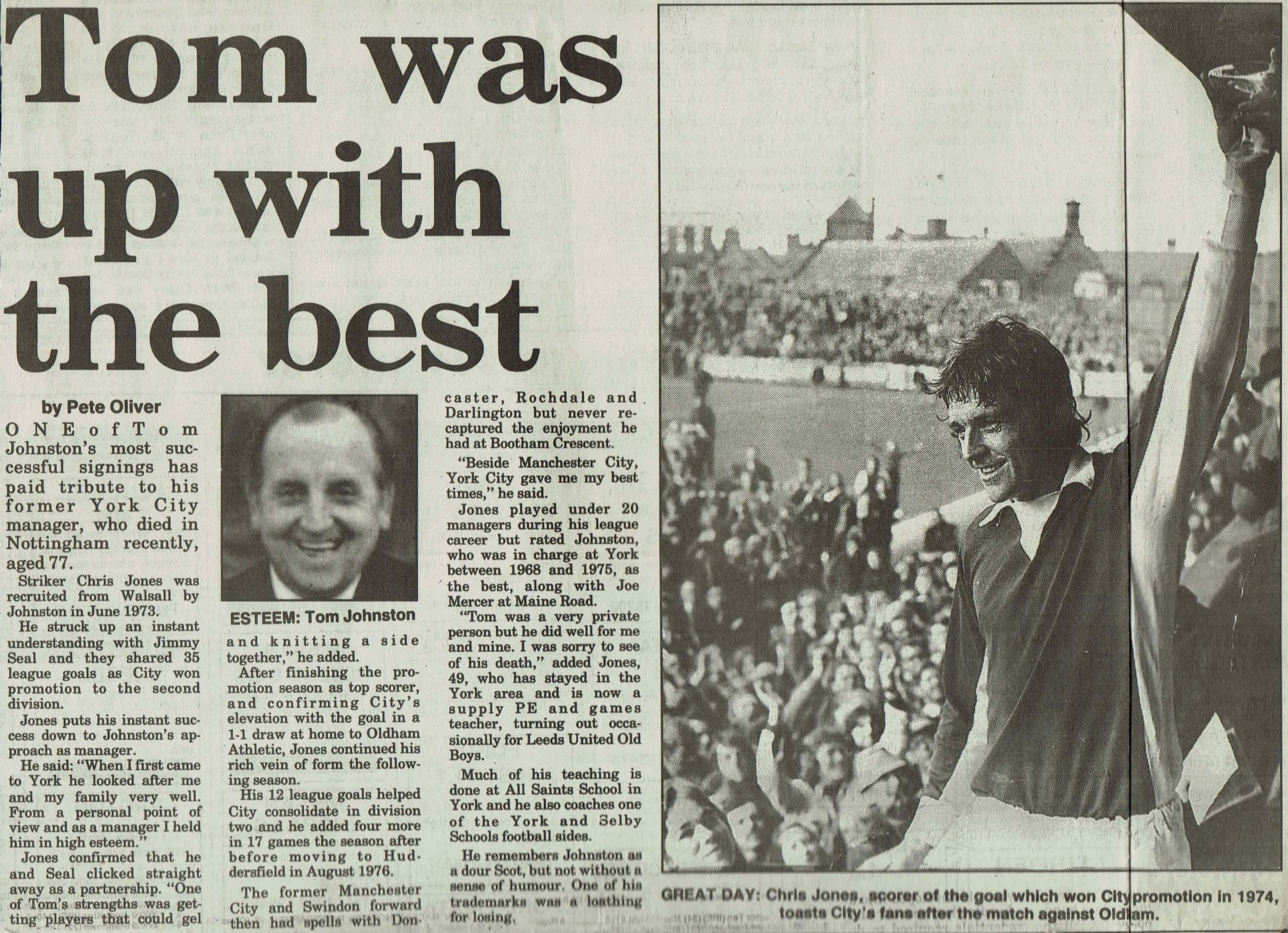

Chris Jones
In Brief
Christopher Martin Nigel "Chris" Jones was born on November 19th 1945 in Altrincham, nowadays a leafy suburb of South Manchester.
He was signed as an amateur by Manchester City following an open trial. An early claim to fame was playing in the 1964 FA Youth Cup semi final for Manchester City against their local rivals, Manchester United, who featured George Best. Alongside Jones in the City side was Phil Burrows, the pair were to be re-united nearly 10 years later at Bootham Crescent.
Under Joe Mercer and Malcolm Allison, Jones made the very fringes of the first team at Maine Road without establishing himself as a regular. He made a couple of first team appearances in the 1976/8 season which saw Manchester City crowned champions of England. He was a prolific scorer for the reserves (top scorer 3 seasons in succession) and other junior sides at Maine Road.
A contemporary of Francis Lee, he was to lose out to Neil Young for the left sided striking role, his cause wasn’t help when Tony Coleman was signed from Doncaster to give them both competition.

He left Maine Road for Swindon and was a member of their Football League Cup winning squad in 1969. He also played for Walsall before joining City the summer of 1973.
In his first season, he was our top scorer, forming a feared strike force alongside the perpetually sweat drenched Jimmy Seal as we climbed into Division 2 for the only time in our history. He fell out of favour with Wilf McGuinness who made it clear that Hinch / Cave was his preferred strike force and either Jones or Seal would need to be sold to raise funds to re-build City following our relegation from Division 2. He re-joined Tom Johnston, who’d signed him for City, at Huddersfield in August 1976.
After leaving City, like so many other players, it was downhill all the way with spells at Doncaster, Darlington and Rochdale before hanging up his boots whilst playing for Rowntree Mackintosh.
Signing for Tom Johnston's Huddersfield, he soon fell out of favour when TJ moved upstairs. At Darlington, he played in a side containing 5 of City's successful side and at Rochdale he played under Bob Stokoe, re-kindling a feud from 1974 which was worsened by an explosive expletive laden BBC TV interview Chris Jones gave when the Rochdale players threatened to go on strike.
For many years, he taught at Tadcaster Grammar School and has been a leading light in local York soccer. He still finds time to act as a summariser on Radio York’s York City coverage.
YCS Guest - Chris Jones
The following is taken from February 9th 2017 when Chris Jones was guest speaker at York City South's social evening with some addition words taken from his book.
A schoolboy footballer in Manchester, his friend, Peter Leigh, who went onto play over 500 games at right back for Crewe, got him a trial with Manchester City. He played as an amateur, for expenses only, before signing his first contract.
He told a nice story that when starring as an amateur in The Youth Cup, one of the club directors said that, as an unknown youngster, he was already worth £15,000 (in an era when the record fee was only £115,000), but as an amateur, Jones could have signed for anyone for nothing.
He was in the same age group as Phil Burrows and was surprised that he was never offered a pro contract. He recalled Paul Aimson at the club, but with Aimson being 4 years older, they didn’t play together.
His book gives the impression that Joe Mercer fancied him whilst Malcolm Allison did not. Vying for a place in the first team, the arrival of Francis Lee effectively ended his Maine Road career although he did play a few games at the start of the 1967/8 title winning season. In total, he scored 2 top flight goals in 7 games for Manchester City.
After Manchester City, he joined 3rd tier Swindon where he was 13th man as they shocked Arsenal to win The Football League Cup Final in 1969. Despite playing well as they got promoted and held their own in what is now The Championship, he fell out of favour and via a loan spell at Oldham, ended up at Walsall.
Altercations followed and although he was in the team, by the end of the 1972/3 season he was looking to move back up north towards his native Manchester. A fall out with his centre half, Stan Bennett, helping to make his mind up.
He recalled when playing for Walsall against City in March 1973 ,our back 4, Swallow, Topping, Burrows and Mackin all had a go at him, systematically he was kicked black and blue by all of City’s back 4, on the few occasions he got the better of them, he found Graeme Crawford impervious in goal. Phil Burrows, shouting at one time, “Oi, send Jesus (the bearded Andy Sinton, Jones’ Walsall striker partner) over here, its my turn to kick him”. Until I read his book, I’d never imagined the likes of Chris Topping (who he believed possessed “the most vicious slide / scissor tackle” in football) and Phil Burrows to be hard man.
It was the second time he’d told the back 4 story. When as a young pro, playing against Liverpool, he was repeatedly kicked by the Reds back four, they called on each other to send Jones in their direction so that they all could have a go at kicking him. Eventually having had enough, Jones thinking he had Chris Lawler behind him, he put an elbow in his face only to see Tommy Smith stricken on the ground, blood pouring from his nose. Jones spent the last few minutes playing behind his own back 4, out of the way of the Liverpool defenders and then made a rapid dash to the changing rooms at the final whistle.
Out of the blue, York City made enquiries. At Walsall, he learned that money was tight and summer wages might not be paid. He negotiated a goodbye deal with the chairman and drove up to York, the Walsall management giving him the transfer papers to take with him and sign if he was happy with what he saw at York. Tom Johnston sold him the club, a club house, recently vacated by Paul Aimson in Woodthorpe was made available and a stay in The Ainsty Hotel until it was ready, swayed the deal.
That day playing against City for Walsall, stuck in Jones’s mind. Jones, believed despite City’s lowly league finish in 1973, with the solid back 4 (plus Graeme Crawford in goal) they wouldn’t concede many goals. He figured with such a defence, York could be in for a better season. Johnston detailed his new signings but reckoned Jimmy Seal had lost all his confidence so the team would rely upon Jones for its goals. A brief medical followed and Chris Jones was a York player (some wag in the audience asked what had changed in City medicals since).
Looking back, he believes only Tom Johnston had real faith in his ability as a striker.
Pre season saw coach Colin Meldrum (“a really great bloke who liked a drink, but couldn’t take it”) drill the front 6. Jones and Seal alternatively dropping off and making diagonal runs, by the end of pre season, the midfield (Butler, Holmes, Pollard and Woodward) could find either of them when blindfolded.
With the addition of Barry Lyons, City belied their close escape from relegation and were promotion front runners all season, confirming promotion with 2 games to spare. Jones top scored with 20 goals, Seal got 17.
From that season Chris Jones’s only regret is that The Football League never gave City‘s players any promotion medals. In the first season of 3 up, the players of champions Oldham and runners up Bristol Rovers all received medals, but not 3rd placed City. It was to be a few years later when all the promoted clubs got players’ promotion medals.
City’s first ever season in Division 2 (now The Championship) started well, the Seal / Jones partnership continued in fine form. January was the turning point. Following an FA Cup draw at Arsenal, Tom Johnston announced his resignation. He was replaced by Wilf McGuinness, one of his first acts was to tell the squad they weren’t good enough. However, we finished the season in 15th place. Seal top scored with 18 goals and Chris Jones bagged 12.
The Johnston years were marked by a series of player disputes. Phil Burrows walked out in 1974 when Tom Johnston took a very hard line when negotiating a new contract. The start of the first Division 2 season was almost marked by a player's strike. The club stopped the players from parking in the club car park on match days, a compromise was eventually reached when City relented and allocated 3 parking spaces to the players. The players would drive to their designated parking spot, all jump into the 3 cars and drive to Bootham Crescent. Even before Jones arrived at City, there was player unrest, some caused by the poor hygiene conditions in the dressing rooms and showers. A vote of no confidence in the manager had resulted in popular coach Billy Horner being replaced by Colin Meldrum in January 1972. The player’s motto at the time was “we’ll win in spite of him (Johnston)”.
1975/6 never got going. Jones was dropped and badly injured his ankle in a reserve game at Sunderland in December. It was to be his last ever City game.
1976/7 saw City start back in Division 3. McGuinness made it clear that Hinch / Cave was his preferred strike force with either Jones or Seal in reserve and the other sold to raise cash for reinforcements. Incidentally, Jones reported that Wilf McGuinness has been suffering from dementia for the past 3 years.
Jones took umbrage and when Tom Johnston, now at Huddersfield, enquired Jones jumped. However, Jones states, “it was the worst time of my career”. Shortly afterwards, Johnston moved upstairs and John Haselden was promoted to team manager. The new manager took an instant dislike to Jones. To this day, Jones doesn’t know why. He wouldn’t play Jones in the first team or the reserves. Jones on hearing another of his former bosses, Fred Ford now at Bristol City, was keen to sign him, but wanted to see him play first, pleaded to be allowed to play for the reserves at Wolves. Ford turned up, Jones wasn’t selected, end of transfer talk.
Jones gave the impression that, not for the first time in his career, he acted too swiftly when he moved on, believing, if he’d stayed with City, give our lamentable form and lack of goals, he’d have won his place back in the first team.
A season at Doncaster followed and included a loan spell with Peter Madden’s Darlington. At the end of the season, he once again joined Peter Madden who was now at Rochdale. He spent his final 2 seasons of league football at Spotland. Again, it ended in some acrimony with new manager Bob Stokoe accusing the players of not trying and attempted to stop their wages. The PFA intervened, Chris Jones, in a feisty BBC interview, when asked why he wasn’t scoring, gave their rookie reporter a mouthful, the only words they could use on TV were along the lines of “If I’m not in the team, I can’t score”. The season ended, Rochdale narrowly avoided re-election (and the real fear of not being re-elected) and Chris Jones was top scorer. However, he wasn’t offered a new contract, he believes Stokoe held a grudge dating back to 1974 and the Sunderland / York Division 2 games and fanned by the dispute earlier in the season at Rochdale.
Jones spent the summer playing in Le Havre, a spell he didn’t enjoy (they were training at 7 in the morning and 5 in the afternoon, his teammates disappearing between sessions), before retiring from professional football when no league club approached him (a spell with Bridlington followed). Jones believes he was still good for another 2 seasons of league football.
Through the ex City player, Ron Mollatt, Jones became involved with Leeds United Old Boys, playing with their stars of the 1970s and earlier for many years, mainly at right back. On one occasion, the legendary John Charles asked him if he was Welsh, on hearing he wasn’t, Charles replied, “Shame, you’re good enough to play right back for Wales”.
Jones recalled our 1974 side with fond memories. He keeps in touch with many of his ex City teammates. It sounds like he’s closest to likes of Graeme Crawford, Jimmy Seal and Chris Topping but noted that Barry Lyons keeps himself to himself, believing Lyons hasn’t forgiven York City for the way he was treated when manager. Outside York, the likes of Phil Burrows (now living in Stockport and not looking a day older now then he was in the 1970s) and Dennis Wann (Blackpool) are still in regular contact whilst John Stones lives in Hull. He described John Woodward as “being a silly boy for leaving his lovely wife and young twins” and ending up as a police warden in Wakefield whilst his ex wife, Gloria, still works for Chris Jones. He noted that Barry Swallow was spotted recently at Colin Sanderson’s funeral and there was some discussion around how he might have invested the reported £250,000 he received from the sale of his City shares.
It was about 14 years ago (2003) when Jones first appeared on Radio York as a match summariser with Jules Bellamy. Gradually, as Radio York expanded their City coverage, so did Jones’ role until he became a regular. A friend of mine, who is a golf buddy of Jones, told me that Jones sometimes found it difficult to commentate on City given the players generally have a lower skill level than his own.
The evening went by all too quickly, we barely had time to talk about the recent goings on at City, but Jones praised Jason McGill and his family for being the only people prepared to put money into City.
PS In his book, Jones makes comparisons between Malcolm Allison and Barry Swallow, citing their confidence, slightly aggressive and arrogant personality. It would have been interesting to see if Barry Swallow could have translated his success as a caretaker manager into something more long lasting.
PS2 Chris Jones played once at Old Trafford. In a knock about cricket game with Manchester United on the famous cricket ground.
Further Reading Read a review of Chris Jones' book, "The Tale Of Two Great Cities" which features tales of behind the scenes unrest at Bootham Crescent, vendettas and the tomfoolery of Wilf McGuinness. Read a review of the York City managers that Chris Jones played under. Footnote